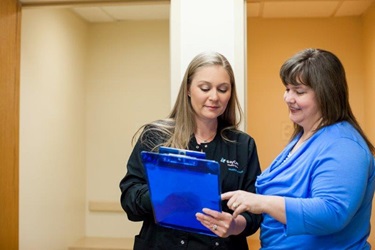Non-Surgical Cancer Treatment at BayCare
Chemotherapy
Many factors play into determining if you will need chemotherapy to treat your breast cancer, including your overall health, your age and what stage your cancer is in. In addition, some patients receive chemotherapy before surgery to help shrink their tumors, and others receive it after surgery as follow up treatment. Your oncologist will help determine if you need chemotherapy and set an appropriate schedule for your treatment.
Radiation Therapy
BayCare offers several types of radiation therapies to breast cancer patients:
- External beam radiation therapy (EBRT) uses strong X-rays, radioactive seeds and particles to destroy, damage and shrink cancer cells and tumors. It is used to stop cancer from returning, relieve symptoms brought on by tumors and treat cancers that cannot be taken out with surgery. External beam radiation aims the X-rays, particles or seeds at the tumor from outside the body.
- Intensity-modulated radiation therapy (IMRT) – IMRT is an advanced form of 3-D radiation therapy that conforms to the precise shape of the tumor by using small beams of varying intensities; this highly targeted approach reduces the risk of damage to health tissues near the tumor.
- Internal radiation therapy – also called brachytherapy, this type of radiation therapy involves an implant in the body (usually right next to the tumor) that delivers beams to the tumor. The implants are inserted into the body through needle-like tubes. Eventually, the implants stop giving radiation and they can either be left in the body or taken out.
BayCare also offers women accelerated partial breast irradiation technology, which consists of a shorter, more intense course of radiation therapy following a lumpectomy. Traditional postoperative radiation therapy involves treating the entire breast with external beam radiation every day for six to seven weeks. With accelerated partial breast irradiation, a balloon catheter is inserted through the breast tissue directly into the lumpectomy bed. A radioactive source then delivers highly targeted radiation dosages through the catheter, every day for only five days. This radiation technique allows patients to complete their course of radiation in just a week.
Immunotherapy/Biological Therapy
Biological therapy (also called immunotherapy, biological response modifier therapy, or biotherapy) uses the body's immune system to fight cancer. The cells, antibodies, and organs of the immune system work to protect and defend the body against foreign invaders, such as bacteria or viruses. Doctors and researchers have found that the immune system might also be able to determine the difference between healthy cells and cancer cells in the body and eliminate the cancer cells.
Hormone Therapy
Some types of breast cancer cells have proteins that estrogen can attach to. Estrogen can then cause these types of breast cancer cells to grow and multiply. Hormone therapy is only used on the types of cancer that have these proteins, and stops the body from making hormones. It can help reduce breast cancer recurrence, and may be administered in combination with other treatments, including surgery, chemotherapy and radiation.


